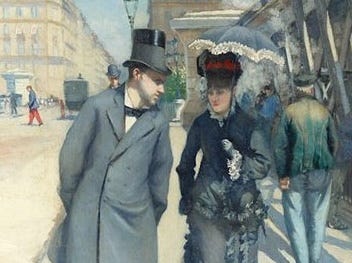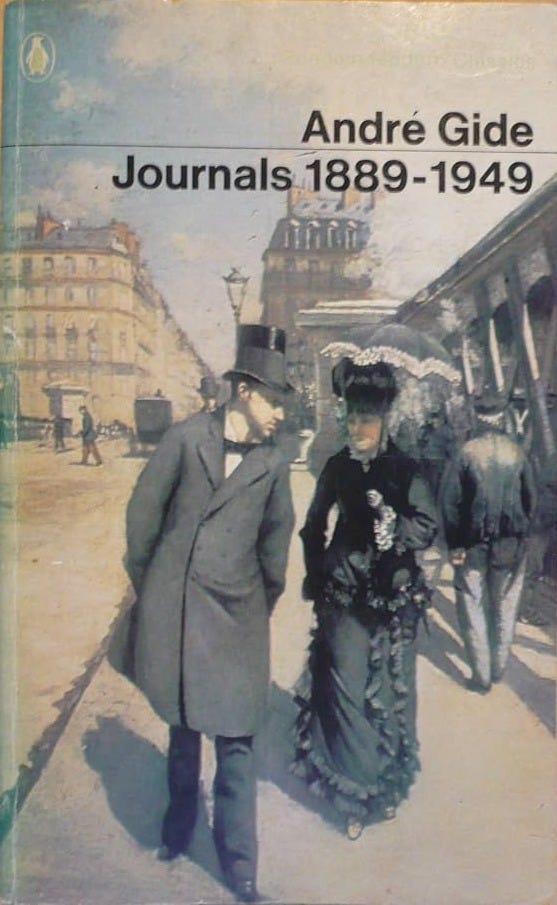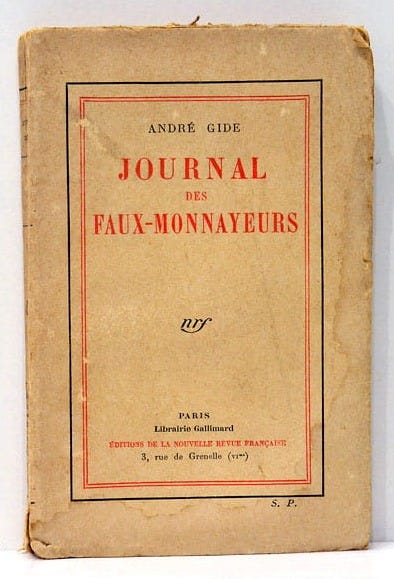Read-along – The Counterfeiters (1 of 6)
Part One, Chapters 1-9 – and Gide's Journals
Dear Counterfeiters,
We’ve read the first nine chapters of The Counterfeiters – how are you finding it? Please do share your thoughts in a comment below. Here are my reactions:
As I mention in the video above, Gide kept a journal throughout his life. His biographer, Alan Sheridan, calls it ‘the pre-eminently Gidean mode of expression’.
The journals of André Gide span sixty years, from 1889 to 1949. He kept them from the age of twenty until the age of eighty, less than two years before he died. André Malraux called them Gide’s ‘obsession’.
Gide published his complete journals in four volumes towards the end of his life, but more relevant to us is the fact that in 1927 he published two of his notebooks as the Journal des Faux-Monnayeurs. This volume has diary entries from June 1919 until May 1925, which chart the conception and construction of The Counterfeiters.
We’ll return to Gide’s Journal of The Counterfeiters in future posts, but for now, here are some excerpts that touch on the inception of the novel and the opening chapters:
17 June 1919
It would probably be foolish to collect into a single novel everything life offers me and teaches me. However closely packed I want this book to be, I cannot hope to get everything in. And yet this desire still bothers me. I am like a musician striving, in the manner of César Franck, to juxtapose and overlap an andante theme and an allegro theme.
19 June
The future interests me more than the past, but even more what belongs neither to tomorrow nor to yesterday but which in all times can be said to belong to today.
25 July
Herewith a definition of friendship I got from Méral: ‘A friend,’ he says, ‘is somebody with whom you’d be happy to do a bad deed.’
1 August
Groped in the clouds for hours on end. This effort to externalize an interior creation, to objectify the subject (before having to subjectify the object) is peculiarly exhausting. For days and days you can make nothing out, and it seems as though the effort has been useless; the important thing is not to give up. To navigate for days on end without any land in sight—this image must be used in the book itself; most artists, scholars, etc., are coastwise sailors who imagine they are lost as soon as they get out of sight of land.—The dizziness of empty space.
21 November 1920
Everything I have seen, everything I have learned, everything that has happened to me for several months, I should like to get into this novel, where it will serve to enrich the texture. I should like events never to be related directly by the author, but instead exposed (and several times from different vantages) by those actors who will be influenced by those events. In their account of the action I should like the events to appear slightly warped; the reader will take a sort of interest from the mere fact of having to reconstruct. The story requires his collaboration in order to take shape properly.
2 January 1921
To write this book properly I must persuade myself that it is the only novel and final book I shall write. I want to pour everything into it without reservation.
13 January
I must note here nothing but remarks of a general sort on the planning, composition, and guiding motive of the novel. This journal must become to some extent ‘Édouard’s notebook’. In addition I am noting on cards things that might be of help: various materials, dialogues, scraps of conversation, and especially anything that may help me in sketching characters.
22 April
While I waited for my luggage, on the arrival of the train that brought me back from Brignoles, the opening scene of The Counterfeiters became clear to me in a sudden flash: Édouard and Lafcadio [Olivier] meeting on a station platform, the ice broken with the sentence: ‘I’ll bet you are traveling without a ticket.’ (I used this sentence to approach the odd vagrant in the Tarascon station I speak about in my journal.)
August
On one side, the event, the fact, the external datum; on the other side, the very effort of the novelist to make a book out of it all. The latter is the main subject, the new focus that throws the plot off centre and leads it towards the imaginative. In short, I see this notebook in which I am writing the very history of the novel poured into the book in its entirety and forming its principal interest—for the greater irritation of the reader.
25 November
At present I have the raw materials, which I must work together and knead. If he didn’t know beforehand from experience that through beating and shaking this creamy chaos he was going to see the miracle repeated—who wouldn’t throw up the job?
7 December
I have written the first thirty pages of my book with hardly any difficulty and currente calamo—although it’s true that for a long time I have had it all worked out in my head. . . . The problem for me is not how to succeed—but rather how to survive. For some time now I have aimed to win my case only on appeal. I write only to be reread.
This week we’ll read the rest of Part One – Chapters 10-18. I hope you enjoy them! I look forward to discussing with you on Friday 16th.
Here are links to our previous The Counterfeiters posts:
The Schedule (11 April)
André Gide (21 April)
0. Le Jardin du Luxembourg (2 May)
And if you’re not planning to read The Counterfeiters with us, remember you can choose to opt out of our conversation. Just follow this link to your settings and, under Notifications, slide the toggle next to ‘The Counterfeiters’. A grey toggle means you will not receive emails relating to this title.







Henry, I'm relieved you said at the end that you'd taken a while to "click" with "The Counterfeiters." I have to admit this has been a tougher one for me to engage with. Thank you, too, for noting the "piling on" of characters.
I'm reading a chapter a day, and several days this week I found I needed to reread yesterday's chapter before starting the next one because I hadn't retained it. My experience so far is that I'm enjoying the writing on a chapter level, but the pull from chapter to chapter has been hard to find. (Except for the lost baggage ticket, of course.)
I keep thinking, This isn't an epic. Why can't I keep these characters straight? While waiting for today's video for you to straighten everything out, I searched for an online study guide with chapter recaps, which led me to Wikipedia's comically complex flowchart of character relationships. On seeing it, my first thought was, Thank God. It's not just me.
I am intrigued by what will happen. He is building a tension from the first chapter onwards. I do feel sorry for Bernard. There is something here about a need to find a “home” somewhere somehow and the people you find along the way that give it to you ( or pretend to maybe we just don’t know yet) … that resonates with me.